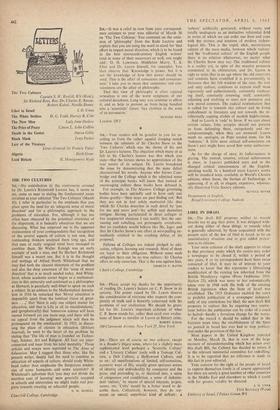Sia,—There are of course no two cultures, except in a
Reader's Digest sense, where (at a slightly more sophisticated level perhaps) a 'Scientific Culture' and a 'Literary Culture' jostle with a 'Teenage Cul- ture,, a Deb Culture, a Hollywood Culture, and so on: all manifestations of limited, self-conscious, eccentric ways of life, usually given spurious senses of identity and individuality by commerce and the press, and pretending to, or deceived into, a sense of ,uniqueness and completion, a sense of indepen- dent 'culture,' by means of special interests, jargon, mores, etc. 'Cults' would be a better word to de- scribe them. Collectively, however, they do rep- resent an unreal, superficial kind of culture: a 'culture' artificially generated, without roots, and totally inadequate as an instinctive referential field in terms of which we can order our lives and cope with the stresses and tensions of modern techno- logical life. This is the vapid, slick, meretricious culture of the mass media, between which 'culture' and the 'traditional culture' of the English people there is no relation whatsoever, no matter what Sir Charles Snow may say. The traditional culture is a reality yet, in spite of the massive pressures committed to its obliteration, and Dr. Leavis is right to insist that in an age where the old reservoirs and conduits have crumbled it is pre-eminently in literature that the felt wisdom of the race, the true and only culture, continues to express itself most vigorously and authoritatively. constantly vindicat- ing itself, constantly renewing itself, constantly adjusting and evolving to meet new pressures and new moral contexts. The ,radical reorientation that is called for is towards this culture and its living embodiment in literature and not towards the in- tellectually sapping clichés of modish highbrowism.
And so Leavis is 'rude' to Snow. If we care about certain values, false scruples shinild not prevent us from defending them, outspokenly and un- compromisingly, when they are menaced. Leavis • needs no apologist, as Pope needed none, for his 'rudeness.' A little more critical self-awareness on Snow's part might have saved him some embarrass- ment.
As for the charge of envy, its ludicrousness is glaring. The central, creative, critical 'achievement is there, in Leavis's published texts and in the changed critical consciousness of the English- speaking world. In a hundred years Leavis's works will be standard texts, available in World's Classics editions, when Snow, the Surtees of Technology, is appearing, if at all, in elegant, expensive, whimsic- ally illustrated Folio Society editions.
NEVILLE DENNY
Department of English, Royal University College, Nairobi


































 Previous page
Previous page